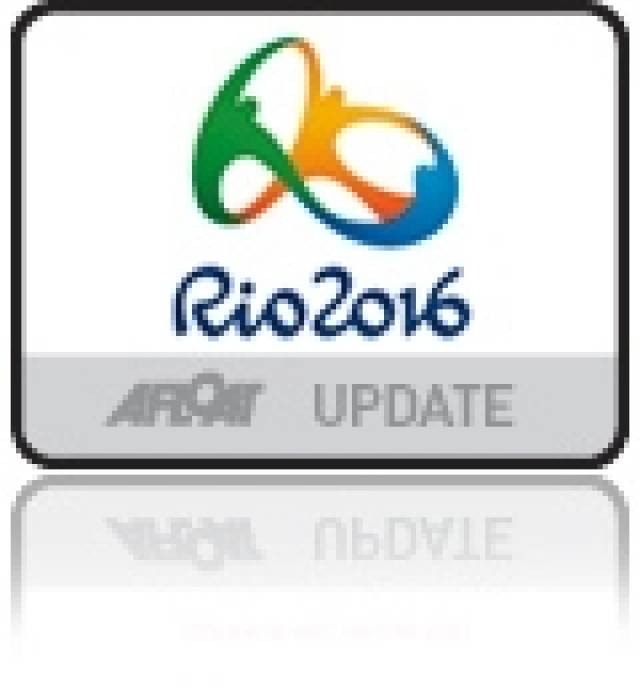#lasereuros2013 – Annalise Murphy wins two more races today to lead the Laser Europeans in Dun Laoghaire by seven points. In bright sunshine, warm temperatures and even an unusual sea breeze, favourite Annalise Murphy remains the only sailor at the Laser European & World Championships to complete the six-race Qualifying Series counting a score line of five race wins.
The satisifed Dun Laoghaire sailor tweeted after racing: 'Wins in both races today @LaserEuros2013 ! I am going to sleep well tonight! #sotired'
The change from the offshore, shifty westerly breezes of the first two days might have been welcomed, but in their place was a difficult, at times frustrating, thermal sea breeze which was often riddled with holes and peppered with puffs which still brought significant changes in wind direction. But the change did not seem to worry Murphy who built a significant lead in both of her races for another two winning guns. But as the Final Series now starts - the business end of the championships - she will face much stiffer competition.
"I'm feeling pretty good. Now it's gold fleet and it will be very different, much harder with twice as many good people in the fleet. I feel good after these last few days but there are three days to go. I am taking nothing for granted. I am just looking to keep sailing well, to get good starts and hopefully it will work out. I don't worry about what the weather forecast might bring, they have been wrong the last three days and so there is no point in speculating" Murphy, who is sailing on her home waters, reported.
She goes forward with a lead of seven points over Belgium's Evi Van Acker, the 2012 Olympic bronze medallist who finished second twice today, whilst the British Sailing Team's Ali Young and Denmark's Sarah Gunni are three points further back on 17 points.
Fionn Lyden drops to second
In the Laser Radial Men's fleet Baltimore's Fionn Lyden dropped to second after a 20th in the second race today but remains only one point behind Australian leader Tristan Brown. "I got everything wrong" Lyden said later, "I had a reasonable start and thought the wind was going to shift left but it didn't. I was in the bottom 15 at the first mark but gained about 15 places on the run. I thought it was going to shift left again on the second beat but it didn't. I then gained a few more places on the reach but finished 20th. It was a weird race".
Last year's European Championships runner-up, Sweden's Jesper Stalheim, goes into the Final Series of the Men's Olympic class with a lead of two points over Brazil's Robert Scheidt who he kept behind him twice today as he sailed to a first and a second, with the five times Olympic medallist taking second and third.
Scheidt confirmed again today that he is racing the Laser not through any sense of obligation but because he loves it, and it is his best option at the moment for him to win a sixth medal. "I think this is my only option in terms of an Olympic class. It is a boat I know, I have the experience, easy to start a campaign. The most important thing is I still enjoy sailing the boat. I would not be doing this if I did not enjoy sailing this boat" he smiled in the Dun Laoghaire sunshine this afternoon.
Of his races today he reported "In the first race I rounded the top mark in 25th and so I was pleased to come back from that. It was pretty difficult with a lot of holes in the breeze. It was very fluky wind, getting up to 16 - 17 knots but then dropping very quickly to four knots. That made the racing very difficult. Also downwind sometimes you were going but sometimes you were stopped. I am happy to have made two results in the top three today. But tomorrow it is like the start of a new regatta. We all start again in the one fleet".
Although Swede Jesper Stalheim sailed to first and second place finishes, he maintained he had found the conditions confounding at times. "It was a game of luck at times and my luck again seemed to work out" said Stalheim, "There were such big pressure differences. You would go from full hiking to no wind in a matter of seconds and just stop. And people would still be going around you. It feels really good to be sailing well though".
"The conditions were weird at the last Europeans where I was second. I must be OK at it. But the standard there was not so high (as many sailors were in Weymouth preparing for the Olympics). I feel I am sailing well. I will have to be good from here."
Stipanovic shares the same raw motivation as Annalise
With a first and a third today Croatia's Tonci Stipanovic is up to third overall. Twice Laser European Champion – in 2010 and 2011 – Stipanovic shares the same raw motivation as Annalise Murphy. He too missed out painfully on an Olympic medal in the Medal Race at Weymouth and Portland just over a year ago.
"It will be difficult as of now. You have to sail well on the first day of the finals, the pressure really is on then. If you don't it becomes complicated. It is not necessary to win races, just get good results" said Stipanovic.
See here for full results






























































